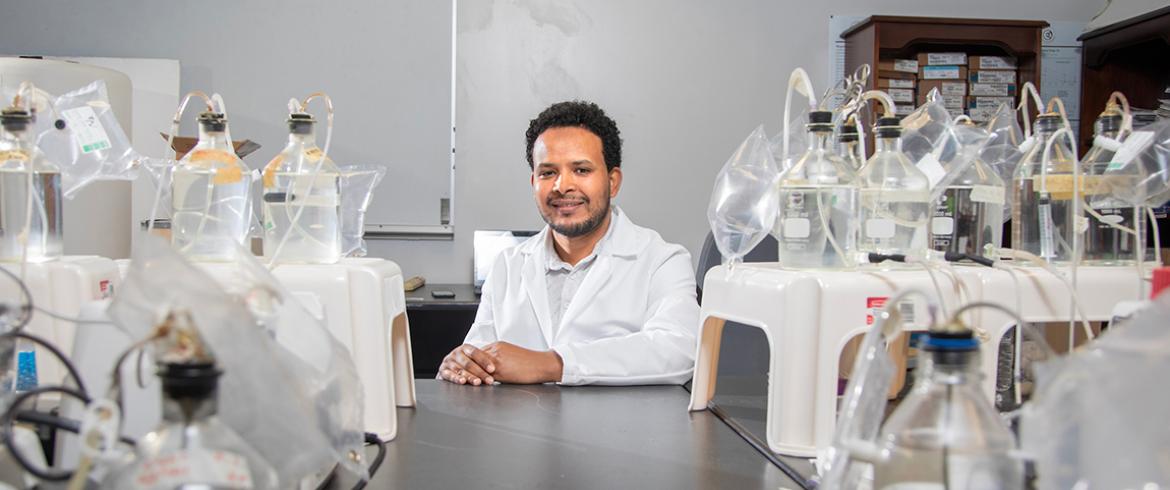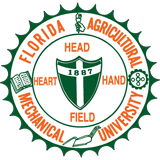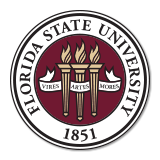
Benhur Asefaw, a graduate student in engineering via Florida State University, recently received a scholarship from the Coastal Plains Chapter of the Air and Waste Management Association (AWMA). (M Wallheiser/FAMU-FSU Engineering)
Benhur Asefaw, a graduate student at Florida State University and the FAMU-FSU College of Engineering, received a scholarship from the Coastal Plains Chapter of the Air and Waste Management Association (AWMA) for his work with the environment.
“The AWMA scholarship is an amazing opportunity as it opens doors from different sectors,” Asefaw said. “Persistence paid off, and I look forward to growing from the experience.”
Asefaw is studying civil and environmental engineering and works with Youneng Tang’s research group to clean contaminants from the water and associated environmental issues.
“Benhur works with me on a National Science Foundation research project,” Tang, an associate professor at the college, said. “As the project’s principal investigator, I have the pleasure of working with him and observing his hard work and dedication first-hand. His recognition from AWMA and scholarship is well deserved.”
Asefaw is from Eritrea, in the Horn of Africa. He shared some thoughts about his path to engineering.
Engineering Interest
When I was young, I was naive and believed that recycling and limiting water use would solve environmental problems. In school, I became interested in chemistry—particularly its application in the environment, construction materials waste and renewable energy.
I got interested in studying water resources at the Eritrea Institute of Technology, where I was part of a study related to drinking water quality and water source pollution. By studying environmental engineering here, I get to participate directly in solving current environmental issues.
The number six goal of the United Nations’ sustainable development objectives is access to clean and safe water. It is the cornerstone for improving healthcare, increasing the food supply, and enhancing people’s quality of life. I want to be part of the solution our world needs.
About Growing Up in Eritrea
Both my parents were teachers. Ever since I started school, my mom and dad used to help me with my homework and supported me in every way. From grade one to eight, I was one of the top three students in a class of 60. In high school, I graduated as a valedictorian and started to think about my future path. The community and relatives encouraged me morally and financially to focus more on my studies so that I would repay them all one day. Dad always tells me, “Knowledge is power, and no one will steal your knowledge. If you want to study or work anywhere in the world, if you are smart and intelligent, everyone will give you a chance.”
Why FAMU-FSU Engineering
Before I was admitted to FSU, I contacted Dr. Tang several times because our research interests are similar. Compared to other universities I was applying to in 2020, the FAMU-FSU College of Engineering Department of Civil and Environmental Engineering had more faculty involved in my research interests.
Research Area
I focus on cleaning industrial wastewater and recovering resources from it. This involves removing toxic contaminants (such as selenate, selenite and tellurite) before it reaches humans or aquatic animals. During the process, we also recover trace elements critical to the U.S. economy and national security.
Why It’s Important
Everyone should care about the environment. In this 21st century, the need for a quality of life is increasing. Too much waste and contaminants are dumped from industries around us, which is dangerous to our health. One way to solve this issue is to get involved in research to develop novel and sustainable methods of contaminant removal and resource recovery. Everyone may not be involved in research, but they can learn how it impacts them.
Most Interesting Research Aspect
The fascinating thing about my research is seeing the non-pathogenic microorganism in my reactor convert the toxic contaminant to non-toxic elemental nanoparticles. When I see the beautiful spherical nanoparticles using an electronic scanning microscope, I tell myself I already started to recover them.
Advice for Fellow Students?
Discover more, devote more time to what you are best at, and never give up. If you don’t get what you want now, it will get better soon.
Post-Graduation Plans
I plan to work as a consultant on local and international environmental issues.
RELATED ARTICLES
Repurposing straw lets farmers grow more food with less water and fertilizer
Microwaving sewage waste may make it safe to use as fertilizer on crops
Researchers Convert Food Waste to Sustainable Energy Using Microwave Technology

